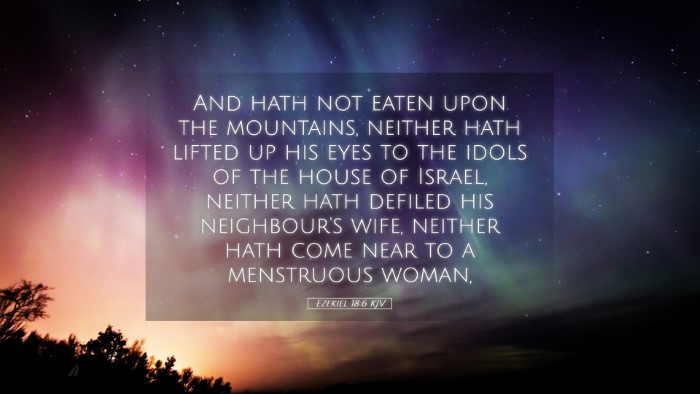Bible Commentary on Ezekiel 18:6
Verse Reference: Ezekiel 18:6 - "And hath not eaten upon the mountains, neither hath lifted up his eyes to the idols of the house of Israel, neither hath defiled his neighbour's wife, neither hath come near to a menstruous woman."
Introduction
The passage of Ezekiel 18:6 is situated within a larger discourse where the prophet Ezekiel addresses the issue of personal responsibility and the nature of sin. This verse encapsulates a definition of righteousness and provides a contrast between the faithful and those who engage in corrupt practices. The insights derived from public domain commentaries such as those from Matthew Henry, Albert Barnes, and Adam Clarke enrich our understanding of this significant text.
Contextual Analysis
Understanding the Immediate Context:
Ezekiel, a prophet during the Babylonian exile, conveys God's message to His people concerning their conduct and the consequences of their actions. In chapter 18, Ezekiel introduces the principle that each person is responsible for their own sins and will be judged accordingly. This is a departure from the inherited guilt notion prevalent at the time, emphasizing individual accountability.
Insights from Commentators
Matthew Henry
Henry emphasizes that the actions described in this verse underline the purity and integrity expected of God’s people. The phrase "hath not eaten upon the mountains" refers to the pagan practices associated with high places where the Israelites often engaged in idolatrous sacrifices. This illustrates a commitment to true worship and the rejection of corrupt religious practices.
- Rejection of Idolatry: The refusal to "lift up his eyes to the idols" signifies a heart turned away from false gods. Henry notes that spiritual devotion must not be divided.
- Morality in Relationships: By abstaining from defiling his neighbor's wife, the individual exemplifies fidelity and respect for others’ sanctity. This speaks to the paramount importance of interpersonal ethics among God’s people.
Albert Barnes
Barnes interprets the verse as a declaration of personal integrity and adherence to the Law. He highlights the systematic nature of righteousness described here and underscores the importance of a holistic approach to piety that incorporates both the avoidance of idolatry and the observance of moral laws.
- Holistic Piety: The mention of the menstruous woman relates to the purity laws found in Leviticus. Barnes explains that such rules were intended to create a distinct community separate from secular influences.
- Consequences of Sin: He indicates that neglecting these standards leads to a decay of both personal and communal integrity, reinforcing that individual actions contribute to the broader moral fabric of society.
Adam Clarke
Clarke elaborates on the deeper implications of the actions specified in this verse. He stresses that true righteousness is not merely about external observance but originates from a heart aligned with God. Clarke posits that each element mentioned serves as an example of a broader principle concerning moral and spiritual integrity.
- Idols and Idolatry: Clarke notes that idolatry is not just the worship of images but can also manifest in the prioritization of anything above God. True followers exhibit a distinct separation from such practices.
- Respect for Relationships: Similarly, the respect for one's neighbor and adherence to the sanctity of marriage signifies a necessary foundation for societal trust and stability. Clarke encourages readers to reflect on their personal relationships within this framework.
Thematic Reflections
This verse brings forth several significant themes that are critical for both theological reflection and practical application:
- Individual Responsibility: As reiterated throughout Ezekiel 18, believers are accountable for their own actions, calling for self-examination and repentance.
- Holiness and Separation: The emphasis on purity speaks to the call for believers to be set apart, living lives that are distinct from cultural norms that contradict biblical teachings.
- Community and Relationship Ethics: Ethical behavior within community dynamics reflects the character of God and serves as a witness to both believers and non-believers.
Conclusion
Ezekiel 18:6 serves as a poignant reminder of the standards of righteousness that God expects from His people. The insights from Matthew Henry, Albert Barnes, and Adam Clarke converge to reveal the depth and implications of this verse. As pastors, students, theologians, and scholars engage with this text, it compels an introspection of personal and communal conduct in light of divine expectations. The call to righteousness encapsulated here not only illuminates the ethical dimensions of faith but also inspires a deeper relationship with God, characterized by genuine worship and integrity.


